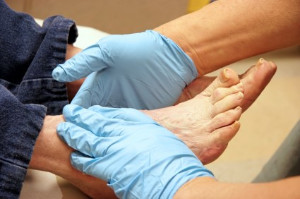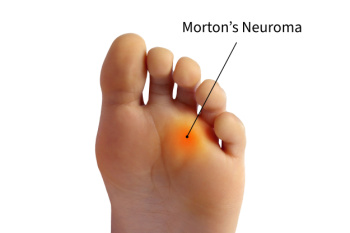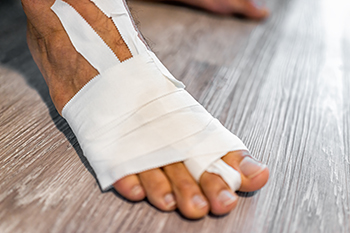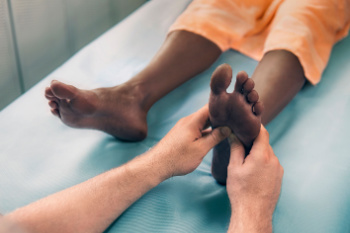Connect With Us
Blog
Items filtered by date: June 2025
Why Diabetic Foot Care Matters

Diabetic foot care is important because high blood sugar levels can damage nerves and reduce blood flow to the feet. This leads to a loss of sensation, called neuropathy, which makes it hard to feel pain, temperature, or injuries. Poor circulation also slows healing, which increases the risk of infections and serious complications. Common symptoms include numbness, tingling, burning, dry or cracked skin, and slow-healing wounds. Feet may appear discolored, swollen, or develop ulcers without noticeable pain. These changes can lead to serious issues if not treated early. A podiatrist can assess circulation, nerve function, and inspect for wounds or deformities. Regular check-ups, proper nail trimming, custom footwear, and wound care are key parts of treatment. Prevention includes daily foot checks, washing and moisturizing the feet, and wearing well-fitting shoes. If you have diabetes, it is suggested that you make an appointment with a podiatrist for ongoing evaluation and treatment.
Diabetic foot care is important in preventing foot ailments such as ulcers. If you are suffering from diabetes or have any other concerns about your feet, contact Zina Cappiello, DPM from Dr. Zina B. Cappiello DPM, LLC. Our podiatrist can provide the care you need to keep you pain-free and on your feet.
Diabetic Foot Care
Diabetes affects millions of people every year. The condition can damage blood vessels in many parts of the body, especially the feet. Because of this, taking care of your feet is essential if you have diabetes, and having a podiatrist help monitor your foot health is highly recommended.
The Importance of Caring for Your Feet
- Routinely inspect your feet for bruises or sores.
- Wear socks that fit your feet comfortably.
- Wear comfortable shoes that provide adequate support.
Patients with diabetes should have their doctor monitor their blood levels, as blood sugar levels play such a huge role in diabetic care. Monitoring these levels on a regular basis is highly advised.
It is always best to inform your healthcare professional of any concerns you may have regarding your feet, especially for diabetic patients. Early treatment and routine foot examinations are keys to maintaining proper health, especially because severe complications can arise if proper treatment is not applied.
If you have any questions please feel free to contact our office located in Clifton, NJ . We offer the newest diagnostic and treatment technologies for all your foot and ankle needs.
Non-Surgical Care Options for Morton’s Neuroma

Morton’s neuroma is a painful condition involving thickened nerve tissue between the toes, often caused by pressure or irritation. Non surgical care focuses on reducing stress to the area and relieving nerve irritation. Switching to wider shoes with soft soles can reduce compression on the forefoot. Custom orthotics may help by redistributing pressure and supporting foot structure. Padding between the toes can also ease discomfort by keeping them in a more natural position. Anti-inflammatory medications may reduce swelling and improve comfort. In some cases, corticosteroid injections are used to calm nerve inflammation. Activity modification, including avoiding high heels or high-impact exercise, may also prevent symptoms from worsening. If nerve pain between the toes continues to interfere with daily life, it is suggested that you see a podiatrist for a diagnosis and a personalized treatment plan.
Morton’s neuroma is a very uncomfortable condition to live with. If you think you have Morton’s neuroma, contact Zina Cappiello, DPM of Dr. Zina B. Cappiello DPM, LLC. Our podiatrist will attend to all of your foot care needs and answer any of your related questions.
Morton’s Neuroma
Morton's neuroma is a painful foot condition that commonly affects the areas between the second and third or third and fourth toe, although other areas of the foot are also susceptible. Morton’s neuroma is caused by an inflamed nerve in the foot that is being squeezed and aggravated by surrounding bones.
What Increases the Chances of Having Morton’s Neuroma?
- Ill-fitting high heels or shoes that add pressure to the toe or foot
- Jogging, running or any sport that involves constant impact to the foot
- Flat feet, bunions, and any other foot deformities
Morton’s neuroma is a very treatable condition. Orthotics and shoe inserts can often be used to alleviate the pain on the forefront of the feet. In more severe cases, corticosteroids can also be prescribed. In order to figure out the best treatment for your neuroma, it’s recommended to seek the care of a podiatrist who can diagnose your condition and provide different treatment options.
If you have any questions, please feel free to contact our office located in Clifton, NJ . We offer the newest diagnostic and treatment technologies for all your foot care needs.
Types and Symptoms of Turf Toe

Turf toe is a sprain of the metatarsophalangeal, or MTP, joint, which connects the base of the big toe to the foot. This injury typically occurs when the big toe bends upward beyond its normal range, damaging the surrounding ligaments and tissues of the plantar complex. Symptoms of turf toe include pain, swelling, bruising, and reduced ability to push off with the toe. Turf toe injuries are grouped into three categories. Grade 1 involves stretching of the soft tissue, resulting in mild tenderness. Grade 2 involves a partial tear, causing more pain, swelling, and limited joint movement. Grade 3 is the most severe, with a complete tear of the soft tissue, often preventing weight-bearing on the toe. Turf toe is frequently experienced by athletes who play on artificial surfaces, especially those who wear lightweight shoes. It can affect gymnasts, dancers and other active people, as well. If you have symptoms of a turf toe injury, it is suggested that you schedule an appointment with a podiatrist for an exam and appropriate treatment options.
Toe pain can disrupt your daily activities. If you have any concerns, contact Zina Cappiello, DPM of Dr. Zina B. Cappiello DPM, LLC. Our podiatrist can provide the care you need to keep you pain-free and on your feet.
What Causes Toe Pain?
Most severe toe pain is caused due to a sports injury, trauma from dropping something heavy on the toe, or bumping into something rigid. Other problems can develop over time for various reasons.
Toe pain can be caused by one or more ailments. The most common include:
- Trauma
- Sports injury
- Wearing shoes that are too tight
- Arthritis
- Gout
- Corns and calluses
- Hammertoe
- Bunions
- Blisters
- Ingrown toenails
- Sprains
- Fractures (broken bones)
- Dislocations
When to See a Podiatrist
- Severe pain
- Persistent pain that lasts more than a week
- Signs of infection
- Continued swelling
- Pain that prevents walking
Diagnosis
In many cases the cause of toe pain is obvious, but in others, a podiatrist may want to use more advanced methods to determine the problem. These can range from simple visual inspections and sensation tests to X-rays and MRI scans. Prior medical history, family medical history, and any recent physical traumatic events will all be taken into consideration for a proper diagnosis.
Treatment
Treatments for toe pain and injuries vary and may include shoe inserts, padding, taping, medicines, injections, and in some cases, surgery. If you believe that you have broken a toe, please see a podiatrist as soon as possible.
If you have any questions please feel free to contact our office located in Clifton, NJ . We offer the newest diagnostic tools and technology to treat your foot and ankle needs.
Keryflex For Fungal Nails
Shoes and Orthotics Can Help Relieve Rheumatoid Arthritis Pain

Rheumatoid arthritis can make each step feel like a challenge. The joints in the feet often become inflamed and tender, which can lead to pain, stiffness, and difficulty walking. Finding the right footwear becomes more than a comfort issue, It becomes part of managing daily life. Orthotics can help ease pressure on affected areas, improve alignment, and support the foot’s structure. Special shoes designed for people with arthritis often have a wider toe box, soft interiors, and extra depth to accommodate inserts. These small changes can have a big impact on how the feet feel during the day. Walking should not be a painful task. If you live with rheumatoid arthritis and have noticed changes in how your feet feel or move, it is suggested that you see a podiatrist for proper relief options.
Because RA affects more than just your joints, including the joints in your feet and ankles, it is important to seek early diagnosis from your podiatrist if you feel like the pain in your feet might be caused by RA. For more information, contact Zina Cappiello, DPM of Dr. Zina B. Cappiello DPM, LLC. Our podiatrist will assist you with all of your podiatric concerns.
What Is Rheumatoid Arthritis?
Rheumatoid Arthritis (RA) is an autoimmune disorder in which the body’s own immune system attacks the membranes surrounding the joints. Inflammation of the lining and eventually the destruction of the joint’s cartilage and bone occur, causing severe pain and immobility.
Rheumatoid Arthritis of the Feet
Although RA usually attacks multiple bones and joints throughout the entire body, almost 90 percent of cases result in pain in the foot or ankle area.
Symptoms
- Swelling and pain in the feet
- Stiffness in the feet
- Pain on the ball or sole of feet
- Joint shift and deformation
Diagnosis
Quick diagnosis of RA in the feet is important so that the podiatrist can treat the area effectively. Your doctor will ask you about your medical history, occupation, and lifestyle to determine the origin of the condition. Rheumatoid Factor tests help to determine if someone is affected by the disease.
If you have any questions please feel free to contact our office located in Clifton, NJ . We offer the newest diagnostic and treatment technologies for all your foot and ankle needs.

